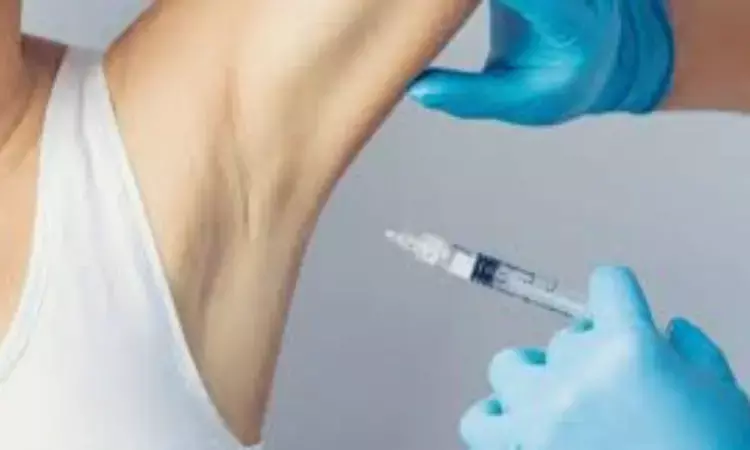- Home
- Medical news & Guidelines
- Anesthesiology
- Cardiology and CTVS
- Critical Care
- Dentistry
- Dermatology
- Diabetes and Endocrinology
- ENT
- Gastroenterology
- Medicine
- Nephrology
- Neurology
- Obstretics-Gynaecology
- Oncology
- Ophthalmology
- Orthopaedics
- Pediatrics-Neonatology
- Psychiatry
- Pulmonology
- Radiology
- Surgery
- Urology
- Laboratory Medicine
- Diet
- Nursing
- Paramedical
- Physiotherapy
- Health news
- Fact Check
- Bone Health Fact Check
- Brain Health Fact Check
- Cancer Related Fact Check
- Child Care Fact Check
- Dental and oral health fact check
- Diabetes and metabolic health fact check
- Diet and Nutrition Fact Check
- Eye and ENT Care Fact Check
- Fitness fact check
- Gut health fact check
- Heart health fact check
- Kidney health fact check
- Medical education fact check
- Men's health fact check
- Respiratory fact check
- Skin and hair care fact check
- Vaccine and Immunization fact check
- Women's health fact check
- AYUSH
- State News
- Andaman and Nicobar Islands
- Andhra Pradesh
- Arunachal Pradesh
- Assam
- Bihar
- Chandigarh
- Chattisgarh
- Dadra and Nagar Haveli
- Daman and Diu
- Delhi
- Goa
- Gujarat
- Haryana
- Himachal Pradesh
- Jammu & Kashmir
- Jharkhand
- Karnataka
- Kerala
- Ladakh
- Lakshadweep
- Madhya Pradesh
- Maharashtra
- Manipur
- Meghalaya
- Mizoram
- Nagaland
- Odisha
- Puducherry
- Punjab
- Rajasthan
- Sikkim
- Tamil Nadu
- Telangana
- Tripura
- Uttar Pradesh
- Uttrakhand
- West Bengal
- Medical Education
- Industry
Single Botulinum toxin-A Injection Outperforms Four FMR Sessions in Managing Primary Axillary Hyperhidrosis: Study

Egypt: In patients with primary axillary hyperhidrosis (PAH), botulinum toxin A (BT-A) treatment demonstrates superior efficacy for up to 12 months, is less painful, and necessitates fewer sessions compared to fractional microneedling radiofrequency (FMR), a recent study has found.
The findings published online in Lasers in Medical Science suggest that fractional microneedle radiofrequency is not a better substitute for BT-A in primary axillary hyperhidrosis.
This study is the first to compare both procedures over a 12-month longitudinal follow-up. While both treatment methods were found to be equally safe, the FMR procedure was more painful than the BT-A injection, the researchers stated. They found that a single session of BT-A injection is more effective in PAH management and yields higher patient satisfaction than four FMR sessions with the microneedle type and parameters used in the present study. After three months, both interventions showed the best efficacy, and then a gradual decline was observed, although some efficacy level was maintained in a few patients for up to 12 months.
Primary axillary hyperhidrosis is an idiopathic condition characterized by excessive and uncontrollable sweating, leading to significant psycho-social challenges. While various therapeutic options are available, each comes with its limitations. Recently, fractional microneedling radiofrequency has emerged as a promising new treatment option.
Against the above background, Vanessa Hafez, Department of Dermatology, Kasr Al-Ainy Faculty of Medicine, Cairo University, Cairo, Egypt, and colleagues aimed to determine the safety and efficacy of FMR in comparison to Botulinum toxin-A in patients with primary axillary hyperhidrosis.
For this purpose, the researchers conducted a randomized controlled clinical trial comprising 20 patients (40 sides). Participants were randomly assigned to receive either fractional microneedle radiofrequency (administered in 4 sessions at 3-week intervals) or botulinum toxin A (administered in a single session), with each side of their body treated with one of these modalities.
Efficacy was assessed at 3, 6, and 12 months using Minor’s starch iodine test, HDSS score, HQoL questionnaire, and patient satisfaction ratings.
The following were the key findings of the study:
- Fractional microneedle radiofrequency, although showed moderate efficacy, is inferior to BT-A regarding longitudinal efficacy at 12 months, as well as patient satisfaction.
- Both treatment modalities were equally safe, but the fractional microneedle radiofrequency procedure was substantially more painful.
The researchers revealed that fractional microneedle radiofrequency, even with four sessions, does not surpass botulinum toxin A (BT-A) in treating primary axillary hyperhidrosis. BT-A offers superior efficacy for up to 12 months, is less painful, more cost-effective, and requires fewer sessions.
"The single-pass technique with non-insulated needles for fractional microneedle radiofrequency (FMR) in this study yields results similar to those of previous studies using a multiple-pass method with insulated needles, though with shorter-lasting efficacy," they concluded.
Reference:
Eid, R.O., Shaarawi, E., Hegazy, R.A. et al. Long-term efficacy of fractional microneedle radiofrequency versus botulinum toxin-A in primary axillary hyperhidrosis: a randomized controlled trial. Lasers Med Sci 39, 177 (2024). https://doi.org/10.1007/s10103-024-04115-x
Dr Kamal Kant Kohli-MBBS, DTCD- a chest specialist with more than 30 years of practice and a flair for writing clinical articles, Dr Kamal Kant Kohli joined Medical Dialogues as a Chief Editor of Medical News. Besides writing articles, as an editor, he proofreads and verifies all the medical content published on Medical Dialogues including those coming from journals, studies,medical conferences,guidelines etc. Email: drkohli@medicaldialogues.in. Contact no. 011-43720751


